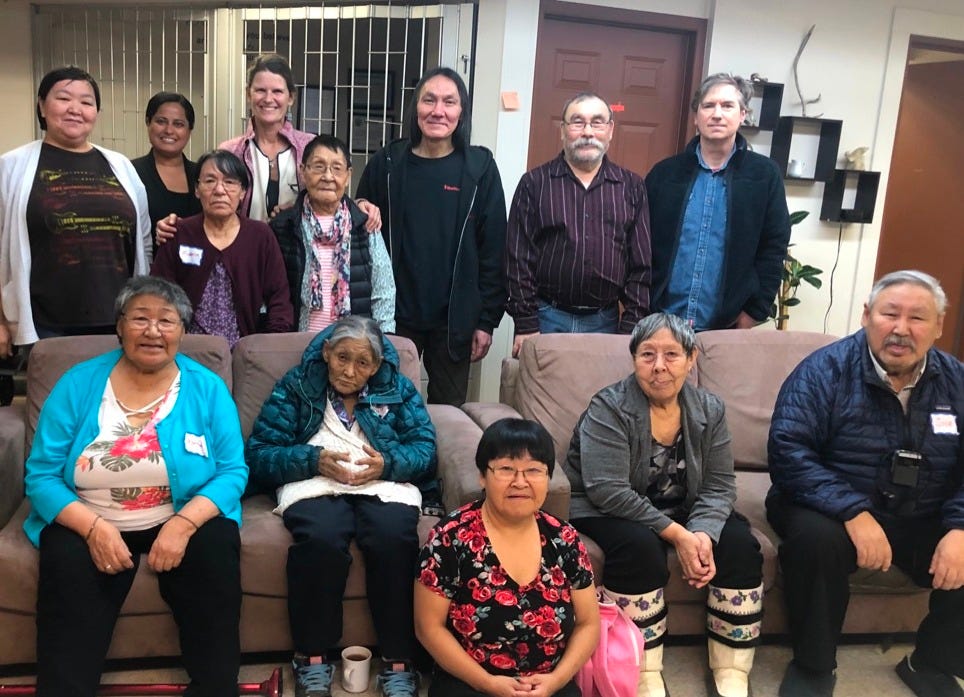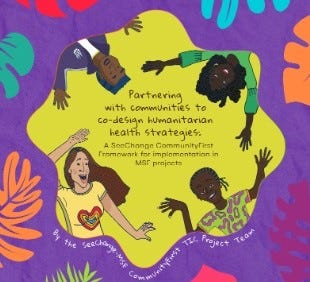Humanitarian work needs to shift towards community-centered and decolonized approaches
An Interview with SeeChange founder Rachel Kiddell-Monroe
In an episode of "The Power Shift: Decolonising Development" podcast, released in January 2025 by the Development Hub, Professor Kate Bird and Dr. Nompilo Ndlovu engaged in a conversation with SeeChange founder and CEO Rachel Kiddell-Monroe. The interview provides insights into the need for a fundamental shift in humanitarian work towards community-centered and decolonized approaches.
Here is a summary of some of the key points of the conversation.
Rachel’s Journey and the Birth of SeeChange
Rachel Kiddell-Monroe began her humanitarian work in the early 1990s, a time when the sector was not yet professionalized. Over the years, she witnessed the transformation of the humanitarian system.
“There were a lot of important things that have been done, but I've also seen how it's become increasingly disconnected from the reality of people and communities on the ground and how it's been perpetuating this sort of charitable model, which is at the heart of this problem of coloniality.”
Being in leading positions and on the international board at Doctors Without Borders/Médecins Sans Frontières (MSF), she witnessed how difficult it was for an organization the size of MSF to make necessary changes fast enough to respond to the cascading humanitarian crises we're facing today, such as the climate emergency, the increase of the number of people on the move, and a growing number of conflicts around the world.
This disillusionment motivated Rachel to establish SeeChange Initiative, aiming to shift humanitarian organizations towards a more community-centered approach, and addressing the colonial structures and mindsets that persist in the sector.
Work with Inuit Communities
In 2018, SeeChange started working with Inuit communities in the Canadian Arctic region to co-create tuberculosis and mental health initiatives.
Rachel emphasizes the ongoing colonialism and structural inequities that these communities face, which are similar to those in some developing countries. Health interventions are imposed from the South, often ignoring Inuit culture and excluding community involvement, leading to ineffective solutions. The Canadian government's top-down approach, focused on working through colonial structures, reinforces inequities. Despite significant funding, little progress has been made in empowering communities. Rachel advocates for decolonized, community-centered approaches that respect Inuit knowledge, foster local leadership, and challenge systemic biases in policy and humanitarian efforts.
“Working with these communities brought home how the issues that they're facing - including tuberculosis and mental health - you can not look at them individually. You have to see them in the context of the historical trauma, the impacts of colonialism, the impacts of racism, and the ongoing colonialism…”
Rachel also discusses the significant challenges organizations like SeeChange face in working with Inuit communities in Canada, including the high costs and logistical difficulties of operating in remote areas.

The challenges of decolonizing the humanitarian sector
Rachel underscores how systemic inertia, privilege, and performative actions impede meaningful decolonization and calls for a fundamental shift in organizational mindsets and practices that emphasize local empowerment and long-term thinking.
Superficial Acknowledgment: While discussions about decolonization are becoming more common, many organizations treat it as a checkbox activity rather than pursuing genuine change. They adopt surface-level commitments, such as including diversity and equity statements, without addressing systemic issues.
Resistance to Change: Many individuals and institutions resist decolonization because it threatens their comfort, privilege, and professional security. The established systems of power and financial incentives discourage meaningful transformation.
Colonial Mindsets and Fragility: Rachel highlights how white privilege and defensiveness ("white fragility") hinder progress. Many white professionals resist being labeled as privileged or racist, despite benefiting from systemic inequalities.
Shallow Listening: A lack of genuine listening prevents deeper understanding. To advance decolonization, organizations and individuals must embrace alternative worldviews, value local voices, and adopt non-linear approaches to problem-solving.
“We have to take the time. That means that the results are slower. The results are not linear. The outcomes are not linear. We have to embrace different ways of thinking - more circular ways of thinking, the idea we have amongst some First Nations here in Canada of the seven generations back and the seven generations forward that every act you take is affecting.”
Cultural Shifts Needed: Rachel calls for adopting Indigenous philosophies, such as Ubuntu and seven-generations thinking, to reshape how organizations operate. This requires patience, humility, and a willingness to relinquish control.
Emergency Contexts: Rachel stresses the importance of applying decolonial principles in emergency responses, as local communities are the true first responders. However, the urgency-driven nature of emergencies often overlooks this need.
“Because who are the first responders in an emergency? It's not you sitting in Geneva with your emergency crew. It's the communities on the ground that are picking up the pieces. They're the first responders. So, yes, you should go there and take the time and understand from them how they want to do it.”
CommunityFirst Approach and Tools
In collaboration with MSF, SeeChange Initiative implemented the Community First pilot project, which co-created health strategies with affected communities in several countries. This approach was also applied by SeeChange in the Canadian Arctic region.
SeeChange has developed several practical tools to support community-centered approaches. These include the Pandemic Response Roadmap, created during COVID-19, which provided communities with clear, actionable steps to organize, prepare, and respond to the pandemic. The Community First Framework, a four-step process (Connect, Engage, Activate, Reflect), was piloted with MSF and aims to integrate community participation into the project cycle. Additionally, a toolkit for participatory monitoring and evaluation ensures that communities are involved in assessing and improving health strategies.
You can watch the full interview on YouTube, listen to it on Spotify, or read the transcript.




